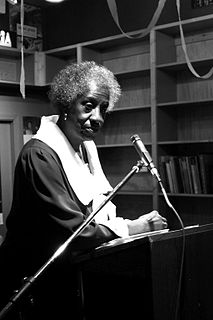A Quote by Vandana Shiva
When the forest is destroyed, when the river is dammed, when the biodiversity is stolen, when fields are waterlogged or turned saline because of economic activities, it is a question of survival for these people. So our environmental movements have been justice movements.
Related Quotes
What's more important is that we talk about movements; change happens through movements. The movement to end slavery, the movement to bring justice for those who have been left out of the system, movements to include women, movements around sexual preference - all these movements brought about change.
Change depends on people knowing the truth. Change depends on people speaking that truth out loud. That's what movements do. Movements educate people to the truth. They pass along information and ideas that many others do not know, and they cause them to ask questions, to challenge their own long-held beliefs. ... Movements are the way ordinary people get more freedom and justice. Movements are how we keep a check on power and those who abuse it.
You build movements and keep people in a struggle when it feels productive. Anti-capitalists have typically been the people in movements who have declared every gain to be a trick of the capitalist class to buy us off. That line isn't very inspiring, and it shows no sensitivity to how social movements actually succeed.
Who among us has not, in moments of ambition, dreamt of the miracle of a form of poetic prose, musical but without rhythm and rhyme, both supple and staccato enough to adapt itself to the lyrical movements of our souls, the undulating movements of our reveries, and the convulsive movements of our consciences? This obsessive ideal springs above all from frequent contact with enormous cities, from the junction of their innumerable connections.
Historically the great movements for human liberation have always been movements to change institutions and not to preserve them intact. It follows from what has been said that there have been movements to bring about a changed distribution of power to do - and power to think and to express thought is a power to do- so that there would be a more balanced, a more equal, even, and equitable system of human liberties.
The emotion is the execution of a very complex program of actions. Some actions that are actually movements, like movement that you can do, change your face for example, in fear, or movements that are internal, that happen in your heart or in your gut, and movements that are actually not muscular movements, but rather, releases of molecules.
I recall coming across a line by the late Charles Tilly when he said, "The conditions for the possibility of social movements have been called into question in the twenty-first century." And I said to myself, my god, a society in history without social movements, for me, is very difficult to live in.
For now, I'm supposing that all movements are equal, which they're not, except in this respect: that none of them gives a damn about artists beyond their immediate utility. Good movements will use a writer just as ruthlessly as bad ones; since they all fancy they have better things to do than worry about one man's artistic survival.
When you start to do research into gorillas or any kind of apes, if you're going to play them, that's one of the biggest misconceptions. And when I did Kong, you're not doing gorilla movements, you're not doing ape movements, you're looking for a personality. It's like saying okay I'm going to do human movements.
Political movements for justice are part of the fuller development of the cosmos, and nature is the matrix in which humans come to their self-awareness of their power to transform. Liberation movements are a fuller development of the cosmos's sense of harmony, balance, justice, and celebration. This is why true spiritual liberation demands rituals of cosmic celebrating and healing, which will in turn culminate in personal transformation and liberation.



































